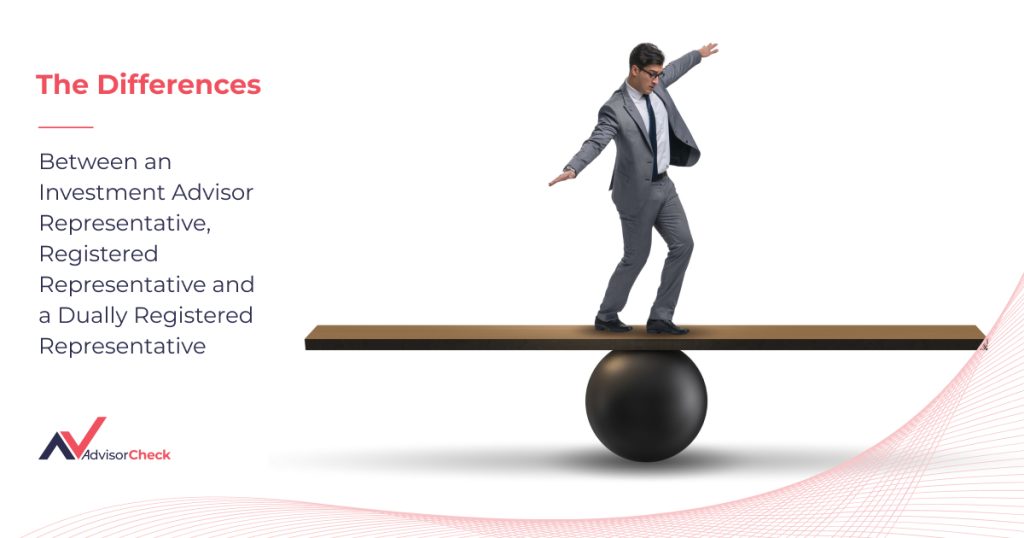Blog

Financial Advisor
Financial Advisor Types: IAR, RR, DRR, CFP, CPWA, CLU, CIMA, ChFC, AIF, CDFA… Who Are They for and What Do They Mean?
We are in the spotlight












When it comes to planning out your finances, having a financial advisor could be the most important aspect of whether or not you will be able to achieve the goals you have set forth for yourself. A financial advisor could be utilized for many purposes, from helping one to create a budget, find areas in their life where they could save money and maximizing their returns from their investments. A financial advisor’s duty is oftentimes met with a fiduciary responsibility, meaning that they are bound to look out for your best interests. Yet, there are some financial advisors who are not bound to a fiduciary standard. Each type of financial advisor works for people in certain types of scenarios. However, there are people who act as if they are financial advisors but do not carry the certifications or credentials listed below. These are the types of advisors you will want to avoid working with, as things could often go wrong when you’re working with an advisor who is not bound to a governing body to ensure that they are working in your best interest. When it comes to regulated financial advisors, they will fall under these three categories: At times, these financial advisors could also have the following types of certifications: If you’re in search of a financial advisor, you’ll need to understand the key differences between these three categories in order to choose a professional whose skills and qualifications match your financial needs. All investment advisor representatives (IARs) are fiduciaries, which means they are held to the highest standard of conduct. As Cynthia Jeffries writes in her Commonwealth article on the subject, under the Investment Advisers Act of 1940, there are two elements of “this strict standard of fiduciary duty”: According to Investopedia’s entry on Investment Advisor Representatives, Investment Advisor Representatives work for Registered Investment Advisor (RIA) firms, where their primary responsibilities include: Investment Advisor Representatives are paid for their services by charging fees only: either at an hourly or flat rate, or as a percentage of assets under management (that is, the value of all the securities that a financial institution manages for their clients, writes the Corporate Finance Institute). Qualifications held by investment advisor representatives vary, but there are some baseline requirements that all Investment Advisor Representatives must meet. Depending on the state in which they are practicing, IARs are typically required to have passed Series 63 and/or Series 65 exams. They may also hold additional qualifications, such as the titles of Certified Financial Planner (CFP) or Chartered Financial Analyst (CFA), but these extra titles are not required to be considered an Investment Advisor Representatives. An Investment Advisor Representative might be worth considering if you’re a current or future investor looking for input on your portfolio. The fact that nvestment Advisor Representatives work for Registered Investment Advisor firms may indicate that they’ve been properly vetted and can therefore give sound professional guidance. And since they’re fiduciaries, investors can be confident they’re keeping their best interests at heart. Registered representatives are required to abide by a suitability standard of care, which means they must always ask themselves, “Is this an appropriate investment for my client?” and behave accordingly (see the Investopedia article on RRs for more details regarding what this standard entails). Importantly, this is a lower standard than the standard of care required of an investment advisor representative. Registered Representatives work for Broker-Dealers, which are firms that buy and sell for their own accounts or on behalf of their customers. As registered representatives, they are charged with the task of buying and selling securities on behalf of clients. Their services are transaction-based and Registered Representatives are generally paid by commission. Becoming a registered representative requires sponsorship from a brokerage firm registered with the Financial Industry Regulation Authority (FINRA). You must also have a General Securities License (allowing you to sell securities), for which you must successfully complete the FINRA Securities Industry Essentials (SIE) and Series 7 licensing exams. A Registered Representative may be a good choice for novice investors or those who want to keep their portfolios on autopilot. Essentially, a Registered Representative does the hard work of investing for you by selecting stocks and actively managing your portfolio. Again, this may be a good choice for those just beginning their investment journey since you’ll be able to trust the expertise of a trained professional. But even seasoned investors can rely on a Registered Representative to manage their portfolios, leaving them free to focus their energies elsewhere. Also known as a “dual hat” advisor, a dually registered representative is an advisor that is registered as both a fiduciary (like an IAR) and a non-fiduciary. In other words, Dually Registered Representatives are registered both as fiduciary advisors, and as brokers for their own firm and its interests. In practice, this means that they can offer advice like a fiduciary, while also selling investment products with a direct incentive (e.g. commission) like a registered representative. Notably, Invested Advisory writes that “most of the large national financial advisory firms you may know and recognize are registered like this, both as a broker representing their firm as well as a fiduciary putting the client’s interests first.” This can be problematic, however, as there is a greater conflict of interest for dually registered representatives than for investment advisor representatives. Customers must be fully aware of these advisors’ dual role while working with them and taking their advice into consideration. The exact requirements of a Dually Registered Representative vary depending on the nature of the “dual” identity. For instance, a Dually Registered Representative may have to meet the requirements of an Investment Advisor Representative in addition to those of a non-fiduciary. As a Dually Registered Representative, this advisor can provide fiduciary and non-fiduciary services to both brokerages and clients. Some investors may need a slight nudge when it comes to investment products. A Dually Registered Representative can represent the interests of their firm in suggesting certain investment vehicles, but since they’re also fiduciaries, investors can be confident they’re not being pushed into a rushed decision. There are many types of certifications when it comes to IARs, RRs and DRRs. The following are the most common and who they are best suited for. A Certified Financial Planner (CFP) assists individuals with their finances. Certified Financial Planners can help with a wide variety of needs, including: Certified Financial Planners have a more comprehensive role than other financial advisors since they offer guidance in multiple areas of financial planning. Most importantly, they have a fiduciary duty, meaning they must make decisions that are in their clients’ best interests. Certified Financial Planners must meet strict standards set by the Certified Financial Planner Board of Standards. At a minimum, Certified Financial Planners must possess a bachelor’s degree (or higher) and demonstrate several years of financial planning experience. A Certified Financial Planner must complete a board-registered program, though they can also qualify if they possess another credential, such as a CPA, CFA, attorney’s license, or Ph.D. in business. After passing a final examination, Certified Financial Planners must stay up-to-date with industry best practices through 30 hours of continuing education every two years. Because Certified Financial Planners offer comprehensive advisory services, they are best for individuals seeking personal financial guidance. And because they have a fiduciary role, CFPs are a reliable choice for those looking for an advisor who will keep their best interests in mind. These are the most common types of financial advisors that most people end up working with. You can search for CFPs near you through the AdvisorCheck search tool. A Certified Private Wealth Advisor (CPWA, formerly known as a Chartered Private Wealth Advisor) specifically serves high-net-worth individuals and families, usually those who make $5 million annually. Certified Private Wealth Advisors provide strategic services that help high earners do the following: Certified Private Wealth Advisors therefore offer a specialized set of services that assist with complex challenges facing high-net-worth clients. To achieve the CPWA designation, candidates must have either a bachelor’s degree or a professional license, such as the CFA, CIMA, or CPA. In addition to five years of professional financial experience, CPWAs must have a strong record of ethical conduct as defined by the Investments & Wealth Institute’s Admissions Committee. The program itself involves six months of rigorous pre-study followed by a final exam. The Certified Private Wealth Advisor qualification is maintained through regular continuing education to provide ongoing knowledge and support to clients. Certified Private Wealth Advisors are best suited for high-net-worth individuals and families. If you earn $5 million yearly, you may use a Certified Private Wealth Advisor to assist with long-range planning, taxes, and other wealth management strategies. You can search for CPWAs near you through the AdvisorCheck search tool. Chartered Life Underwriters (CLUs) focus on life insurance and estate planners. While other industry professionals can serve these needs, Chartered Life Underwriters offer the highest standard of industry knowledge and expert guidance. A Chartered Life Underwriters can assist with such tasks as: Along with a thorough understanding of the insurance industry, Chartered Life Underwriters also possess the unique ability to analyze a client’s physical assets, needs, and liability risks to connect them to the right program. These attributes make Chartered Life Underwriters a preferred choice when selecting an advisor for life insurance. The Chartered Life Underwriter designation is conferred by the American College of Financial Services. Candidates must have three years of full-time business experience within the five years that precede the final examinations. The program itself consists of five core courses as well as three electives, concluding with a total of eight two-hour examinations. Chartered Life Underwriters maintain their credentials with 30 hours of continuing education every two years, including a mandatory one hour of ethics training. Anyone planning for the future of their family could benefit from the guidance of a Chartered Life Underwriter. One of these professionals can provide keen insight into your insurance needs as well as strategic ways to preserve and maximize the value of your estate. You can search for CLUs near you through the AdvisorCheck search tool. As the name suggests, a Certified Investment Management Analyst (CIMA) focuses on investment consulting. A Certified Investment Management Analyst can provide advanced input regarding topics like: A Certified Investment Management Analyst will often work for a larger consulting firm, though they’ll spend considerable time working directly with clients. As such, Certified Investment Management Analysts possess strong communication skills, empowering their clients to make informed decisions about their investment strategy and goals. Courses and accreditation are offered through the Investments & Wealth Institute. To qualify for CIMA certification, candidates must have at least three years of financial services experience and meet the Institute’s standards of ethical conduct. Coursework is completed at institutions like the Wharton School or the University of Pennsylvania, or online through the Yale School of Management. Certified Investment Management Analysts must also maintain their expertise through recertification, which includes 40 hours of continuing education every two years. Certified Investment Management Analyst scan provide expert-level investment guidance, which makes them ideal advisors for those looking to grow their assets to meet long-term goals such as retirement. You can search for CIMAs near you through the AdvisorCheck search tool. A Chartered Financial Consultant (ChFC) offers many services that overlap with a Certified Financial Planner. However, Chartered Financial Consultants possess specialized knowledge regarding estate planning and employee benefits. Chartered Financial Consultants can work with individuals or organizations. When working with individuals, a ChFC can offer guidance on such topics as: When working with an organization, Chartered Financial Consultants can assist with corporate investment strategies or the administration of employee benefits. While a Certified Financial Planner can help with individual finance, a Chartered Financial Consultant can assist with retirement planning and corporate financial strategy. Certification comes through the American College of Financial Services and consists of eight online self-study courses, which must be completed prior to a final exam. This gives a ChFC a broad knowledge base regarding subjects that include estate planning, tax planning, and employee benefits administration. ChFCs maintain their knowledge base with 30 hours of continuing education every two years, which includes at least one hour of ethics training. A Chartered Financial Consultant can be an ideal choice for those considering early retirement. These individuals can help with asset allocation and investment strategy to make these dreams possible. Business owners and corporations can also rely on Chartered Financial Consultants to guide corporate finance and benefits administration. You can search for ChFCs near you through the AdvisorCheck search tool. An Accredited Investment Fiduciary (AIF) is another type of investment advisor. What makes them stand out is their fiduciary status, which means they’re obligated to act with integrity to serve their clients’ best interests. This is important, as not all investment advisors have this fiduciary role. An Accredited Investment Fiduciary therefore serves as a trustworthy, authoritative guide for investors. Accredited Investment Fiduciaries can work in banks, broker-dealer firms, or registered investment advisory (RIA) firms, where they spend a great deal of time handling customer accounts and offering support. The Center for Fiduciary Studies qualifies candidates using a point system, which assigns them scores in areas like education, experience, and professional development. To certify as an AIF, candidates must complete a web-based or capstone program from the Center for Fiduciary Studies, followed by a comprehensive exam. To stay abreast of new trends, AIFs are required to obtain at least six hours of continuing education each year. Investors have many options when it comes to seeking a financial advisor, but an Accredited Investment Fiduciary is among the most dependable. That’s because, as a fiduciary, an AIF is bound to act in their clients’ best interests. As such, you can be sure that you'll receive sound advice about your portfolio along with the information you need to make confident, well-informed financial decisions. You can search for AIFs near you through the AdvisorCheck search tool. During a divorce, a Certified Divorce Financial Advisor (CDFA) can provide counsel to couples and their attorneys in order to achieve the most equitable settlement possible. This can be particularly important when a couple divorces after many years of marriage, at which point it can be difficult to disentangle formerly-shared assets. Typically, clients and their respective attorneys will devise a plan for the division of assets, as well as alimony, child support, or other expenditures. A Certified Divorce Financial Advisor will review this proposal, serving as a third party to ensure that the agreement is equitable before the couple signs. Certified Divorce Financial Advisors have no legal authority and cannot serve as attorneys. With that being said, they can help to smooth the emotionally and financially complex process of divorce and achieve an end that’s fair to both parties. CDFAs earn their credentials from the Institute for Divorce Financial Analysis, which administers a qualifying exam. Candidates must have a bachelor’s degree with three years of financial experience, or they may substitute five years of experience for a degree. CDFAs maintain their status with 30 hours of continuing education every two years, which keeps them up-to-date on the best practices for alimony, asset allocation, and more. If you’re going through a divorce, it can help to bring a CDFA into the process as early as possible. Doing so can save you time, which can, in turn, save you money that you would otherwise spend on attorney fees or other legal costs. With so many financial advisors to choose from, how do you know which one is right for you? The answer is that it simply depends on your situation. Here are some general guidelines to consider when selecting a financial advisor. First and foremost, what are your financial goals? Understanding why you need an advisor in the first place can help steer you toward the right one. For instance, if you’re looking for guidance with your investments, it makes sense to consider a CIMA or AIF. By defining and narrowing down your goals, you’ll be able to select an advisor who aligns with your long-term plans. Depending on your goals, you may need to decide between a generalist and a specialist. What’s the difference? A CFP is an example of a generalist, as this advisor can help with a variety of personal finance questions. If, however, you’re experiencing a divorce or need specialized help with your investments, you’ll need to select an advisor who makes these areas a professional focus. Many types of advisors offer personal financial and investment guidance to individuals. But a Chartered Financial Consultant (ChFC) can help you make corporate decisions or assist with employee benefits if you operate a business. Investors must understand the difference between the various types of financial advisors in order to make informed decisions regarding which kind of professional they’d like to work with. As we’ve explained, both the standard of care and the standard of duty are significantly higher for an investment advisor representative than for a registered representative. This means that if an investor is seeking someone to manage their funds, then they will most likely want to hire an IAR. If an individual is looking to buy securities (i.e. stocks, bonds, or options), then a registered representative may be the best choice to fill that role. Finally, investors should be keenly aware if their financial advisor is dually registered, as an advisor’s duty of care to their clients is based on the parameters of their specific role (IAR, RR, or “dual hat”). Just because a financial advisor has certifications and is being overseen by a governing body does not automatically mean you should work with them. Here are five reasons you shouldn’t work with an advisor, along with three reasons why you should. To learn more about financial advisors and how to keep yourself financially healthy, become a free AdvisorCheck member and get access to all of our resources, from our white papers to budgeting guides, along with the best financial resources delivered straight to your inbox. If you like our content, please give us a like and subscribe as it really helps us to continue to provide relevant information. Written by: Billy Quirk Fact checked by: KJ Kim Reviewed by: Dan Hattori Disclosure The information provided in this article was written by the research and analysis team at AdvisorCheck.com to help all consumers in their financial journeys, by providing the resources and the insights to help improve one’s financial health, make it through recessionary and inflationary periods of time, and save their earnings to use them towards building a secure financial future. Unauthorized reproduction or use of this material is strictly prohibited without prior approval. Any parties interested in content syndication, references, interviews, or PR, please contact our marketing team at marketing@aimranalytics.com AdvisorCheck.com is an independent data and analytics company founded on the principles of helping to provide transparency, simplicity, and conflict-free information to all consumers. As an independent company providing conflict-free information, Advisorcheck.com does not participate, engage with, or receive funding from any affiliate marketing programs or services. To become a free AdvisorCheck member, visit advisorcheck.com/signup.
The Differences Between an Investment Advisor Representative, Registered Representative and a Dually Registered Representative

Investment Advisor Representatives (IARs)
Required Qualifications for Investment Advisor Representatives
Who Should Use an Investment Advisor Representative?
Registered Representatives (RRs)
Required Qualifications for Registered Representatives
Who Should Use a Registered Representative?
Dually Registered Representatives
Required Qualifications for a Dually Registered Representative
Who Should Use a Dually Registered Representative?
While the Above Lists the Types of Advisors, What Could Matter Most Is Their Certifications and How They Relate to You

Certified Financial Planner (CFP)
Required Qualifications for Certified Financial Planners
Who Should Use a Certified Financial Planner?
Certified Private Wealth Advisor (CPWA)
Required Qualifications for Certified Private Wealth Advisors
Who Should Use a Certified Private Wealth Advisor?
Chartered Life Underwriter (CLU)
Required Qualifications for Chartered Life Underwriters
Who Should Use a Chartered Life Underwriter?
Certified Investment Management Analyst (CIMA)
Required Qualifications for Certified Investment Management Analysts
Who CIMAs Are Best For
Chartered Financial Consultant (ChFC)
Required Qualifications for Chartered Financial Consultant
Who Should Use a Chartered Financial Consultant?
Accredited Investment Fiduciary (AIF)
Required Qualifications for Accredited Investment Fiduciaries
Who Should Use an Accredited Investment Fiduciary?
Certified Divorce Financial Advisor (CDFA)
Required Qualifications for Certified Divorce Financial Advisor
Who Should Use a Certified Divorce Financial Advisor?
Which Type of Advisor Is Right for You?

What Are Your Financial Goals?
Generalists or Specialists
Personal or Business
Why the Difference Between Advisors Matters

Most read
The content of video and blog articles are for informational and entertainment purposes only and do not constitute investment, tax, legal, or financial advice. Always consult with a qualified professional before making any financial decisions. The views expressed are those of the author and do not reflect the opinions or recommendations of any affiliated entities.